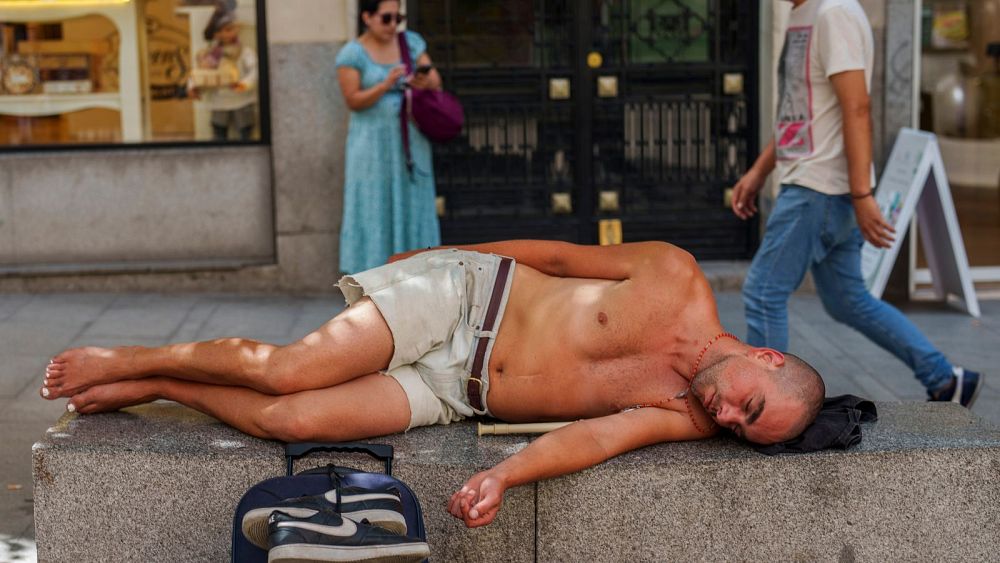
With temperatures as high as the ones reached in Europe this week, not even our bodies’ built-in cooling system, sweat, can protect us from overheating. Here are some tips on how to keep safe when it’s too hot outside.
On Tuesday, the Mediterranean island of Sardinia hit 44C, while Rome reached 40C. The scorching heat has led Italian authorities to issue red weather alerts for 23 of its 27 main cities on Wednesday, urging people to stay cool and hydrated and remain indoors during the hottest hours of the day.
As much as most of us love a sunny, warm day, this is not what we think about when we dream of the summer season. In fact, this level of heat is simply too much for our bodies to handle safely. In the mildest of cases, the heat would make us sweat and cause our hands and feet to swell uncomfortably. In serious cases, it may cause confusion, seizure, and even passing out.
What happens to the body under extreme heat?
The goal of our bodies is to keep a core temperature of around 37C.
“The body works a whole lot to defend its core temperature, it doesn’t like it changing,” Professor Lewis Halsey, one of the University of Roehampton’s researchers behind a recent study on our “upper critical temperature”, the maximum temperature the human body can reach before starting to malfunction, told Euronews.
When it gets hotter, our body just works harder to return to its default temperature, opening the blood vessels near the skin wider to lose heat and sweat it out.
“Sweat is our key response, the one way we can cope with the heat,” Julie Davies, a professor at UCL Global Business School for Health, told Euronews.
The liquid lost through sweat must somehow be replaced by drinking more water. If we fail to do that, we can become dehydrated, a condition which can lead to dizziness and faint feelings — what we call “heat exhaustion”.
The symptoms of heat stress and heat exhaustion can include dizziness, nausea, fainting, confusion, tiredness, heavy sweating, headaches, and muscle cramps, according to the UK’s National Health Service (NHS).
If the body temperature rises above its upper limit — which has been identified by Halsey and his colleagues as between 40 and 50C — we can suffer a heatstroke, which may cause our internal organs to start swelling and malfunctioning, with potentially fatal results.
“At a certain temperature, you can’t sweat enough to keep your body cool,” Davies said. “If you’re getting an awful lot hotter than 35 or 37 degrees, you are at risk of a heart attack or a heat stroke.”
“The proteins of the body start to denature – they stop functioning, and nerve impulses don’t work as well. The nervous system is less effective, and that’s integral to the body. It would start affecting the heart, because the heart is a muscle in itself,” Halsey said.
“If that generates an arrhythmia [an abnormal heart rhythm] and the heart is not pumping blood as effectively around the body because it’s ‘out of sync’, that could cause low oxygen levels. If oxygen levels to the brain are undefended, then you’re in real trouble.”
According to a recent report, an estimated 61,000 people died in Europe last summer because of extreme heat.
A recent study in New York also found that heat can exacerbate mental illness, with researchers finding that on hot days there were more emergency hospital visits from patients suffering from anxiety, schizophrenia, dementia, and substance abuse.
Who is most at risk?
“We are all vulnerable to the impacts of extreme heat but some of us are more vulnerable than others,” Raquel Nunes, assistant professor in Environmental Change and Public Health at the University of Warwick in the UK, told Euronews.
“Older adults, babies and young children, pregnant women, individuals with pre-existing health conditions, outdoor workers, socioeconomically disadvantaged individuals, and those experiencing homelessness are some examples,” she continued.
“Nevertheless, other factors can contribute to heat-related impacts such as social isolation and housing quality, for example.”
Those most vulnerable are often at a higher risk of heat-related illnesses and death but these impacts are preventable and avoidable, Nunes added. “To protect these high-risk individuals, it is essential to implement personalised and targeted strategies and interventions.”
In order to do so, we need a “whole-of-society and multi-faceted approach,” Nunes said, “involving community engagement, public health initiatives, urban planning, and collaboration between government agencies and community organisations.”
What should you do when it’s hot?
The most important thing is to stay out of the sun as much as possible, especially during the warmest time of the day, as recommended by the World Health Organization (WHO). Stay in the shade, do not leave children or animals in parked vehicles, and spend between 2 and 3 hours of the day in a cool place.
Avoid training outdoors during the hottest times of the day and try to cool down your home at night if possible. Keep your curtains or blinds down in the morning to avoid your home heating up.
Experts and authorities recommend staying hydrated and cooling down when overheating, as well as taking advantage of places with air conditioning. Wear loose-fitting clothes as opposed to tight-fitting ones and avoid sugary, alcoholic or caffeinated drinks, WHO says.
“Hydration is very important,” Davies said. “Don’t exert yourself, take a cold bath, cover your windows when it’s sunny. Don’t cook, insulate hot pipes. If you can, work early or work late.”
If you or someone else feels unwell because of the heat, WHO recommends moving to a cool place, rehydrating, and measuring your body temperature for at least half an hour. If your body temperature remains high, you should seek help from a health specialist.
